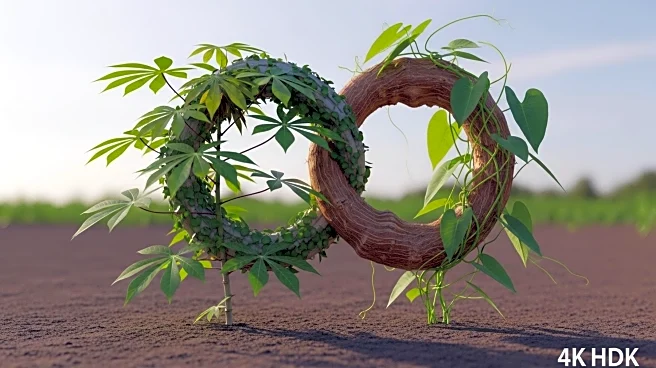What is the story about?
What's Happening?
Dr. Mercy Diebiru-Ojo, a scientist with IITA-CGIAR, has been named one of the 2025 Africa Food Prize Laureates for her significant contributions to agricultural transformation in Africa. Her work with Semi-Autotrophic Hydroponics (SAH) technology has revolutionized the production of cassava and yam, two staple crops in sub-Saharan Africa. This technology enables rapid multiplication of clean, disease-free planting materials, ensuring that improved crop varieties reach farmers more efficiently. Dr. Diebiru-Ojo's efforts have transitioned SAH from a research innovation to a practical enterprise model, benefiting farmers and seed entrepreneurs across the region.
Why It's Important?
Dr. Diebiru-Ojo's achievements are pivotal for enhancing food security and agricultural productivity in Africa. By improving seed systems, her work supports the livelihoods of millions of farmers who rely on cassava and yam as staple foods. The SAH technology not only boosts crop yields but also creates economic opportunities for youth and women in agriculture, promoting sustainable development. This recognition underscores the importance of scientific innovation in addressing food security challenges and highlights the potential for similar technologies to transform agriculture in other regions.
What's Next?
The success of SAH technology may lead to its adoption in other parts of the world facing similar agricultural challenges. Continued support and investment in such innovations could further enhance food security and economic development in sub-Saharan Africa. Stakeholders, including governments and international organizations, may explore partnerships to expand the reach of this technology. Additionally, the recognition of Dr. Diebiru-Ojo's work may inspire further research and development in agricultural technologies, fostering a new wave of innovation in the sector.
Beyond the Headlines
The recognition of Dr. Diebiru-Ojo's work highlights the critical role of women in advancing agricultural science and technology. Her achievements may inspire more women to pursue careers in agriculture and science, contributing to greater gender equality in these fields. Furthermore, the success of SAH technology demonstrates the potential for scientific research to drive economic and social change, encouraging policymakers to prioritize investment in agricultural research and development.















